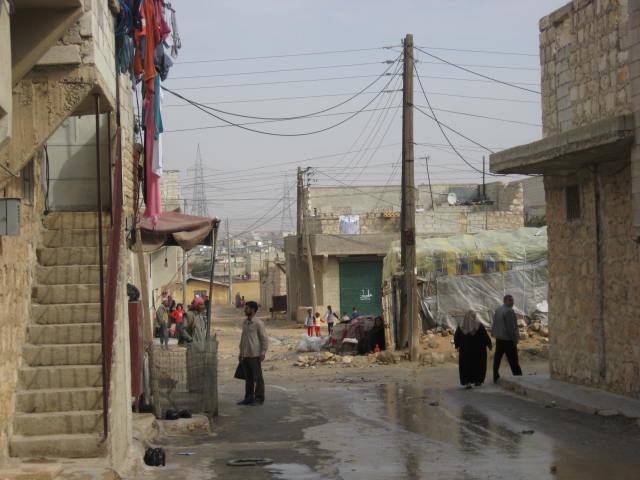
Informal Settlements in Aleppo, Syria: developing a city-wide policy and implementation strategy (Patrick Wakely)
Submitted by frankie on Fri, 2009-06-19 21:12.
Wakely 2022
Aleppo has a population of some 2.4 million that grew very rapidly through rural-urban migration during the 1970s and '80s. The population growth rate has slowed down, though it is still estimated to be in the order of 2.8% per year. Some 45% of the population live in informal or ‘illegal’ settlements, which constitute c.35% of the city’s built-up area. This means that in these areas:
The views expressed in 'Recent News & Reflections' are those of the author and do not necessarily reflect those of any of the governments, organisations or agencies with whom they have been working.
In 2008, Patrick Wakely started a part-time contract with the GTZ Syrian-German Sustainable Urban Development Programme to help develop a municipal policy and implementation strategy for informal settlements (IS) in Aleppo. This is linked with the development of a broader-based City Development Strategy (CDS) also being assisted by GTZ, (German Agency for Development Co-operation, the implementing agency of the German Ministry for Economic Co-operation), and the Cities Alliance. The early stages of this on-going programme have already raised interesting issues around government, governance, decentralisation and participation in the context of a country in transition to a social market economy and administration at the national, municipal and local levels.
 |
Aleppo has a population of some 2.4 million that grew very rapidly through rural-urban migration during the 1970s and '80s. The population growth rate has slowed down, though it is still estimated to be in the order of 2.8% per year. Some 45% of the population live in informal or ‘illegal’ settlements, which constitute c.35% of the city’s built-up area. This means that in these areas:
- the ownership of the land is in dispute and/or is not legally registered; and/or
- the settlement is in contravention of the master-plan zoning regulations; and/or
- planning standards are not met; and/or
- dwellings are constructed in contravention of building standards and regulations.
- high-rise (5-7story), high density and unsafe settlements that present a direct danger to life and limb;
- medium and low density (1-3 story) settlements that, though structurally safe, are under-serviced and present a potential threat to health and wellbeing; and
- settlements that are structurally and environmentally safe but are in contravention of prevailing norms and development control legislation.
Eighty percent of the informal settlements fall into categories 2 and 3, the majority of which only need the transfer of title to land (much of it already in public ownership) and official acceptance of their adequate standards of construction, to render them ‘formal’ and legal. However, despite policy intentions to decentralise such issues as planning and building standards and urban land management1, Syria remains wedded to the centralist principles of state control of urban development and social housing provision, despite persistent evidence that it has neither the technical nor the financial resources to implement them.
Within this national political context the city of Aleppo has a reputation for independence and innovation and a strong and progressive mayor2 who is half way through his second and last four-year term of office. His support for the regeneration of the Old City centre, the CDS for the economic development, promotion and marketing of the city and the instigation of a municipal IS policy could have a significant impact on the initiation of change in urban policy at the national level.
An Informal Settlements Steering Committee has been established with a mandate to draft an IS policy and strategy for consideration by the Mayor and Municipal Council. Its members include senior municipal technical staff, independent professionals, the University of Aleppo and representatives of the lowest level of public administration3. To inform the policy preparation process the GTZ supported project is assisting with three inputs:-
1. A ’Rapid Profile’ study of all informal settlements in the city that provides an overview of the history, society, economy, infrastructure, services and environment of each of the 28 IS, giving emphasis to their diversity and a preliminary classification of their conditions, problems, assets and potentials. (This component has been completed and published as an illustrated report in English and Arabic).
2. A study of informal land and property markets in Aleppo, built on the premise that they are efficient and effective in making affordable land and housing accessible to the lowest income groups and concluding with a review of current legislation suggesting how it might be amended in ways that would legalise informal procedures without destroying their commercial and social advantages. (The study was in process in July 2009).
3. The establishment of community organisations in two sample IS neighbourhoods with different social and land tenure conditions to test and demonstrate approaches to decentralised participatory governance. Through a series of focus-group discussions, priority problems are identified and community-centred approaches to resolving them locally are developed in partnership with municipal authorities and other relevant agencies. (This component was in process in July 2009). |
- ________________
1 e.g. the Ninth and Tenth National Five Year Plans: 2000-2005 and 2006-2010
2 Dr Maan Chibli, an engineer and urban planner (École Supérieure, University of Paris), Associate Professor of Planning, University of Aleppo.
3 Neighbourhood Committee representing c.3,500 households (113 committees in the city)
